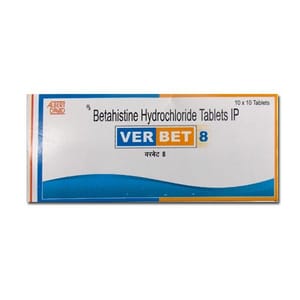vbeta
Introduction to vbeta
Vbeta is a medication primarily used to manage symptoms associated with Meniere's disease, such as dizziness, vertigo, tinnitus (ringing in the ears), and hearing problems. While it helps alleviate these symptoms, it is important to note that vbeta does not cure the underlying condition.
Composition of vbeta
Vbeta contains the active ingredient Betahistine, which works by modifying the body's use of a substance called histamine. This action improves blood flow to the inner ear and brain, aiding in the recovery of the balance system and helping the brain adjust to dizziness.
Uses of vbeta
- Relieves dizziness and vertigo
- Reduces tinnitus (ringing in the ears)
- Improves hearing problems associated with Meniere's disease
Side effects of vbeta
Common side effects:
- Nausea
- Indigestion
- Headaches
Serious side effects:
- Stomach problems like vomiting, pain, or bloating
- Skin reactions such as rash or itching
Precautions of vbeta
Vbeta should not be used by individuals with a rare tumor called phaeochromocytoma or those allergic to it. If you have conditions like stomach ulcers, asthma, hives, rashes, hay fever, or very low blood pressure, it is crucial to inform your doctor, as they need to exercise caution when prescribing this medication.
How to Take vbeta
- For adults, the initial dosage is a 16mg pill taken three times a day, preferably with food.
- Your doctor may adjust your dose to be between 24mg and 48mg total per day.
- Vbeta is not recommended for children under 18 years of age.
Conclusion of vbeta
Vbeta is an effective medication for managing symptoms of Meniere's disease, such as dizziness and tinnitus. While it does not cure the disease, it can significantly improve the quality of life for those affected. Always follow your doctor's instructions and report any side effects or concerns promptly.












.svg)
